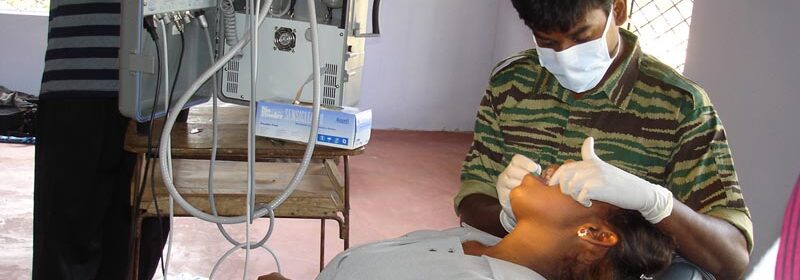The lack of healthcare infrastructure in tamil eelam

ANAGHAH SANIKAPALLY – The lack of adequate healthcare infrastructure in Tamizh Eezham (Tamil Eelam), a heavily contested region in north Sri Lanka primarily inhabited by the nation’s ancestral Tamizhan (Tamilian) minority, has heavily affected healthcare delivery. Many hospitals and clinics in Tamizh Eezham suffer from a lack of essential medical equipment, supplies, and qualified personnel, leading to substandard healthcare services. This situation is compounded by the government’s neglect and underinvestment in Tamizhan-majority areas, perpetuating disparities in access to healthcare between Tamizh Eezham and other regions of Sri Lanka, predominantly those inhabited by the Sinhala majority.
The ongoing political tensions and military presence in Tamizh Eezham further impede efforts to improve healthcare infrastructure and delivery. Restrictions on movement, particularly in conflict-affected areas, often prevent patients from accessing medical care when needed. The lasting effects of various war tactics on the civilian Tamizhan population by the government, such as the use of white phosphorus (an act illegal under both the Geneva Convention, of which Sri Lanka is ratified, and other international humanitarian laws) is intensified by state-sanctioned militarization of healthcare facilities, creating an atmosphere of fear and mistrust among Tamizhan patients. This absence of comprehensive healthcare services in Tamizh Eezham not only affects physical health but also exacerbates poverty and inequity amongst its inhabitants.
Addressing the lack of healthcare infrastructure in Tamizh Eezham requires not only a domestic approach but an approach that has support from the international community—an approach that involves increased investment in medical facilities, equipment, and personnel, as well as the removal of barriers to healthcare access imposed by the political and military establishment. It is my opinion that if the government of Sri Lanka does not make efforts to rebuild trust between the Tamizh community and enforce adequate access to healthcare services without fear or discrimination from healthcare providers, Tamizh Eezham should, with full backing and support of the international community, be able to form its own autonomous and independent state. Ultimately, however, achieving equitable healthcare in Tamizh Eezham necessitates political will and commitment from both the Sri Lankan government and the international community. The goal of revitalization of not only healthcare infrastructure in Sri Lanka but of the Tamizh people in the nation does not function in a void. Prioritizing the health and well-being of everyone all across the globe is a connected struggle, and the hope of improvement can only be fulfilled by an equally collective effort.
Copy Editor – Sreeja Challa
Photography Source – https://www.tamilguardian.com/content/teaching-tamil-tigers
